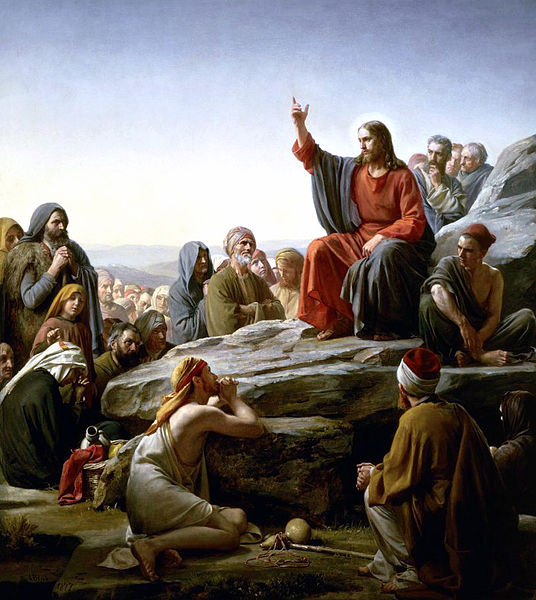A Marion prayer that I often overlook in my daily prayer routine is Mary’s Magnificat. It contains Mary’s words when she visited her cousin Elizabeth in the Visitation which we meditate on in the Second Joyful Mystery of the Rosary. The text is as follows.
My soul proclaims the greatness of the Lord,
my spirit rejoices in God my Savior,
for he has looked with favor on his humble servant.
From this day all generations will call me blessed,
the Almighty has done great things for me,
and holy is his Name.
He has mercy on those who fear Him
in every generation.
He has shown the strength of his arm,
he has scattered the proud in their conceit.
He has cast down the mighty from their thrones,
and has lifted up the humble.
He has filled the hungry with good things,
and the rich he has sent away empty.
He has come to the help of his servant Israel
for he has remembered his promise of mercy,
the promise he made to our fathers,
to Abraham and his children for ever.
Glory to the Father, and to the Son, and to the Holy Spirit,
as it was in the beginning, is now, and will be for ever.
Amen
On Catholic Exchange, this article discusses how the Magnificat is another great Marion prayer to meditate on especially since it focuses on praise and thanksgiving for all God provides us. Not only does the prayer’s text itself come from an event recalled whenever we pray the Second Joyful Mystery of the Rosary, but many of the themes in the Magnificat are reflected in other mysteries as well. Let’s take a look at a few.
When I pray the Third Joyful Mystery, The Nativity, I often meditate on how the shepherds in the field came to Jesus after angels announced His birth. I think about how they took time off from their work to rejoice. And this is Mary’s tone in the Magnificat; one of joy and thanksgiving. She talks about how God has done great things for her and how she’s blessed.

Do we take time out of our day to thank God for all He has done for us? Or are we only focused on life’s challenges asking God to make things easier? Do we think about how Mary’s life, as blessed as it was, wasn’t easy? And yet she still rejoiced in what God gave her. And did the shepherds ignore the angels’ announcement of Jesus’ birth? No, they went and rejoiced at Jesus’ manger. Do we take time out of our day to rejoice in what God has provided us, both the big and the small?
The middle portion of the Magnificat reads like the Beatitudes. Mary proclaims how the proud will be “scattered” and the humble “lifted up.” In essence, those humbly living for God’s kingdom will be the ones who will eventually find happiness in Heaven. And that is a core theme of the Third Luminous Mystery, The Proclamation of the Kingdom of Heaven. Jesus proclaims the greatness of His Father’s kingdom and asks us all to convert from our prideful, earthly ways to heavenly ones.
It takes humility and faith to accept something we cannot experience with our physical senses. In fact, God asks us to do more than just accept His will. We must fully embrace it with a sense of joy. Mary wasn’t tepid in her response to God’s calling and neither should we. We may not know the details of what God has in store for us, but we do know that His plan ends with us joining Him forever in Heaven. And that knowledge alone should be more than enough to make us excited over embracing our faith to the fullest.

The Catholic Exchange article ends with talking about the difference between happiness and joy. The Magnificat is a prayer of joy. Mary didn’t say she was happy, she said she was joyful. She must have known that her life wasn’t going to be easy after accepting God’s calling and it wasn’t always going to be happy. She did experience periods of great sadness such as witnessing Jesus’ crucifixion and death which we meditate on in the Fifth Sorrowful Mystery.
We too will experience challenges and unhappiness; some more than others. But that doesn’t mean we can’t live joyfully knowing that God has made a place for us in Heaven. We can live joyfully by seeing all the blessings He has provided us that we may otherwise overlook in our daily lives.
I encourage you to pray the Magnificat daily, either before or after the Rosary. I think it will help flip the mentality that many of us have which is focusing mostly on our hardships and asking God to help us. The Magnificat will provide balance because we’ll also see all that God does provide and blesses us with daily. There’s a saying in the classic 80’s movie, Ferris Bueler’s Day Off. Ferris says, “Life moves pretty fast. If you don’t stop and look around once in a while, you could miss it.” I think the Magnificat conveys something similar — “life moves fast and if you don’t slow down and appreciate God’s blessings, you could miss them.”
